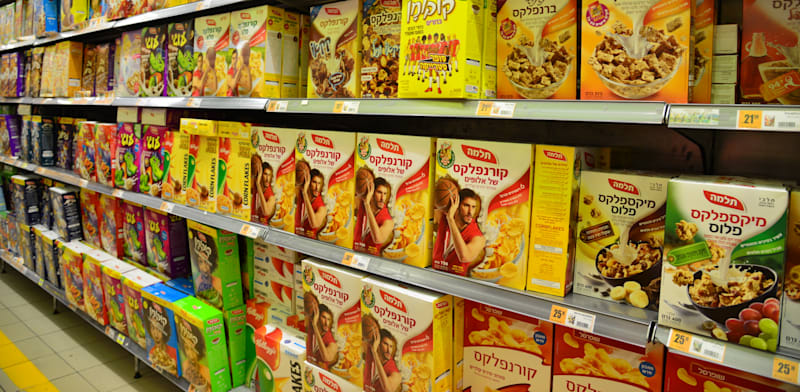
Final week Israel’s greatest meals producers raised costs. Over the previous two years, meals costs have risen quicker than housing costs and the (CPI) shopper value index. Between March 2023 and March 2025, meals costs in Israel (excluding contemporary vegatables and fruits) rose 8%, greater than the CPI (6.2%) and greater than housing costs (7.6%). When fruit and greens are additionally taken under consideration, meals costs have jumped by 9.5%.
Producers, for his or her half, level to a rise in inputs, however knowledge present that costs from a number of the inputs are literally lowering. Add to this different elements like restricted competitors, ineffective value controls and a concentrated market, and Israel has a recipe for value will increase.
The most recent wave of value hikes continues to be in full swing. Final week, inside a couple of hours, Unilever, Strauss, Central Bottling Co. (Coca Cola Israel) and Gad introduced value will increase for dozens of merchandise and this week meals conglomerate Tnuva and importer Diplomat have hiked costs. The worth will increase have an effect on quite a lot of merchandise from breakfast cereals and soups to dairy merchandise and mushy drinks, and vary from a couple of % to about 15%, within the case of a Diplomat, which amongst many manufacturers imports Heinz.
Meals is turning into costlier as enter costs fall
As with virtually each value hike, producers complain they have to pay extra for inputs, and should cross on no less than a few of these value will increase to shoppers. Panda Chocolate CEO Daniel Barkat says, “Our fundamental uncooked materials cocoa has skyrocketed.” Certainly, world cocoa contract costs have greater than tripled within the final two years. As well as, he says that different inputs have additionally grow to be costlier, “together with air freight, vitality and, after all, wages for staff.”
Throughout these two years, air freight costs have risen 25%, electrical energy charges have risen virtually 5%, and nominal wages have additionally been rising persistently, together with the minimal wage that was up to date final month. Nonetheless, sea freight, which is related to different producers and importers, is slowly returning to pre-war ranges. Delivery costs jumped in 2024, reaching virtually $8,000 for delivery a container from China to the Mediterranean final summer time, after the closure of Bab al-Mandab by the Houthis. As of early Might 2025, the value has fallen to round $3,000.
There have additionally been value reductions in commodities, after the dramatic surge that started in 2020 because of the world commodity glut. Some fundamental meals commodities like sugar and corn are nonetheless tens of % costlier than in 2019, however their costs have been reduce considerably within the final two years, as has the value of soybeans.
RELATED ARTICLES
Wheat costs have additionally fallen lately, and but bread costs in Israel have truly risen. A coverage doc from the Producers Affiliation reveals that whereas world wheat costs have fallen 18% since 2021, the wholesale value indices for white flour and whole-meal flour have risen by 23% and 38%, respectively.
Utilizing power available in the market to dam competitors
The worth will increase on grocery store cabinets are usually not uniform. In line with Aviv Hatzbani, director of the Meals Industries Affiliation, it’s merchandise whose costs are underneath authorities supervision which have risen at a a lot quicker fee: “The supervised merchandise and those who rely on managed inputs from the federal government have risen in value at a better fee than different meals merchandise, as a result of the formulation requires the federal government to look at the associated fee basket of producers and replace the value accordingly.”
He provides, “The worth will increase happening in Israel at the moment are similar to these seen in OECD international locations.” The answer, in his view, is to maneuver past direct subsidies to farmers, as an alternative of a “goal value” that units, for instance, a minimal value that individuals are obligated to pay for milk and eggs. However whereas the speed of meals value will increase is much like that within the OECD, costs in Israel are larger to start with in comparison with different OECD international locations, with Israel virtually all the time rating first or second within the OECD’s value of dwelling index, together with the a lot wealthier Switzerland.
In line with public foyer NGO Foyer 99, “The phenomenon of continued rises within the product value index, regardless of the decline in commodity costs, stems from the ‘stickiness’ and rigidity of costs within the meals market, which characterize non-competitive markets.” The NGO explains that there’s a important lack of competitiveness within the Israeli financial system amongst meals producers, with producers utilizing their market power to dam rivals and keep excessive costs.
Quite a lot of reforms have proposed to ease the price of dwelling, particularly in meals however did not penetrate all of the regulatory hurdles and permit importers to freely usher in merchandise from overseas. The “What’s good for Europe is nice for Israel” reform promoted by the present authorities additionally goals to do precisely that, however within the meantime, its exceptions committee continues to be assembly, and it is too early to know whether or not it’ll achieve bringing about important change.
Both approach, meals costs in Israel are at the moment rising at a quicker fee than within the US, for instance, the place meals costs have risen 5.3% within the final two years, in contrast with 8% in Israel for meals excluding fruit and greens and 9.5% with fruit and greens, that are a part of the American index, are additionally thought-about.
Buying energy of Israelis is being eroded
So whereas many inputs have certainly elevated, meals costs are additionally rising dramatically in comparison with different costs. The CPI is moderated by different sectors akin to clothes and furnishings, that are virtually fully imported, and their competitiveness is clear and is mirrored in a fall in costs within the final two years.
The results of this development is that actual wages, i.e. the worth of wages in buying energy, have hardly modified previously two years. In line with the Central Bureau of Statistics, the typical actual wage in Israel fell by 1.4% in February 2025 in contrast with February 2024. In different phrases, though the typical wage is rising, costs have risen at a fair quicker tempo previously yr, in order that the typical wage in Israel is ready to purchase barely lower than final yr. The Financial institution of Israel famous in a presentation it revealed that “actual wages are larger than their pre-war degree, however proceed to stay under the long-term development.” In any case, when nominal wages rise, that is one other enter that meals producers must consider, and it’s typically the one which fuels value will increase in a phenomenon referred to as the “wage-price spiral.” Within the meantime, Israelis’ buying energy is eroding whereas costs proceed to climb. Until there’s a revolution in competitors or inputs, the value spiral will proceed.
Revealed by Globes, Israel enterprise information – en.globes.co.il – on Might 6, 2025.
© Copyright of Globes Writer Itonut (1983) Ltd., 2025.





